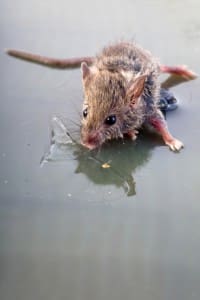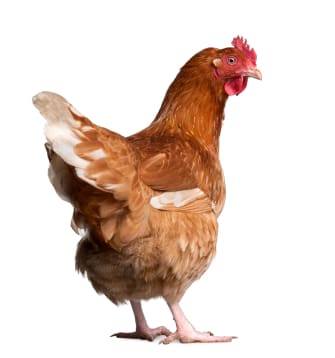 Imagine walking to the store. Suddenly, you can’t lift your feet from the ground – they’re mired in glue so sticky that you can’t lift them out. You scream and fight to get loose, but nobody helps you. You get thirsty and hungry, but there’s nothing you can do. After hours, maybe even days, you eventually succumb to dehydration, starvation, exhaustion and/or exposure. Can you think of a more inhumane death?
Imagine walking to the store. Suddenly, you can’t lift your feet from the ground – they’re mired in glue so sticky that you can’t lift them out. You scream and fight to get loose, but nobody helps you. You get thirsty and hungry, but there’s nothing you can do. After hours, maybe even days, you eventually succumb to dehydration, starvation, exhaustion and/or exposure. Can you think of a more inhumane death?
Glue traps are the method of choice for removal of rats and mice, because they’re pesticide-free. But they are extremely cruel, causing an agonizing death. And they’re indiscriminate – they can capture birds, squirrels, and other small animals.
They are also unsafe for humans. Mice or rats will void their bowels when they’re caught. This exposes humans to dangerous diseases like Hantavirus which are carried by rodents. Even Health Canada says they shouldn’t be used.
The best way to deal with rodent infestations is to alter the habitat so it’s no longer attractive to them. This means carefully closing off every possible entry point (after you’ve safely removed the animals) so it’s inaccessible. We recently had mice in our small cottage, and we waited until night when they were outside and used fine wire mesh to seal every hole in the crawl space and the entire house. We then installed an inexpensive sonic repeller on each level and we haven’t had mice inside since. These electronic devices are available everywhere, even on Amazon.ca!
Mice and rats are social, intelligent creatures and every bit as capable of experiencing pain as the dogs and cats we have in our homes. Excluding wildlife is the kindest way to live alongside them. But as an absolute last resort, a snap-trap is less inhumane than a glue trap or poison (which also causes an excruciatingly painful death). Snap-traps kill instantly.
Unfortunately, glue traps are available everywhere. Please contact these stores who sell them and tell them to remove them from the shelves:
Home Depot Canada: Sold online and in stores
Mouse and rat glue traps
Bill Lennie, President
Home Depot Canada 1 Concorde Gate, Ste. 900 Toronto, Ontario M3C 4H9
Head office phone number (416) 609-0852
(No email address available.)
Canadian Tire: Sold in stores
Mouse glue traps
Stephen G. Wetmore, President/CEO
Canadian Tire
PO Box 2000, Station Main
Welland, Ontario
L3B 5S3
Wal-Mart: Sold online and in stores
Mouse and rat glue traps
Shelley Broader, President/CEO Wal-Mart Canada
1940 Argentia Rd. Mississauga, Ontario
L5N 1P9
Email address: cacustrel@wal-mart.com
Amazon Canada:
Sold online
Mouse and rat glue traps
Jeff Bezos, CEO
Amazon Canada
1200 12th Ave. South, Ste. #1200 Seattle, WA
98144-2734
(Headquarters for Amazon Canada and USA.)
Email address: jeff@amazon.com
Home Hardware:
Sold in stores
Mouse and rat glue traps
Paul Straus, President/CEO
Home Hardware
34 Henry St St Jacobs, Ontario
N0B 2N0
Email: contactus@homehardware.ca
Lowe’s
Sold online and in stores
Mouse and rat glue traps
Alan Huggins, CEO
Lowe’s Canada
5160 Yonge St.
Suite 200
Box 25 North York, Ontario
M2N 6L9


